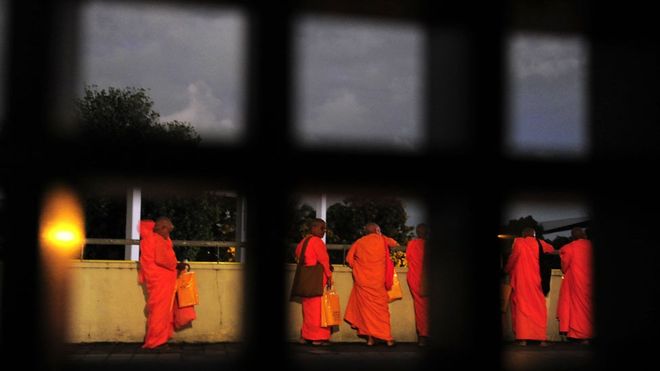
Buddhist monks at the Bodu Bala Sena (BBS) or Buddhist Force convention in Colombo on September 28, 2014. Photo AFP
The small temple in the suburbs of Colombo is quiet. An image of the Buddha is surrounded with purple and white lotus flowers. Smaller Buddhas line the walls.
But upstairs, a burly monk in a bright orange robe holds forth – for this is one of the main offices of a hard-line Buddhist organisation, the Bodu Bala Sena or Buddhist Power Force (BBS).
The peaceful precepts for which Buddhism is widely known barely figure in his words. Instead, the monk, Galagoda Aththe Gnanasara Thero, talks of his Buddhism in terms of race. Most Buddhists here are ethnically Sinhalese, and Sinhalese make up three-quarters of the island’s population.
“This country belongs to the Sinhalese, and it is the Sinhalese who built up its civilisation, culture and settlements. The white people created all the problems,” says Gnanasara Thero angrily.
He says the country was destroyed by the British colonialists, and its current problems are also the work of what he calls “outsiders”. By that he means Tamils and Muslims.
In fact, while a minority of the Tamils did indeed come from India as tea plantation workers, most of them, and most of the Muslims, are as Sri Lankan as the Sinhalese, with centuries-old roots here.
“We are trying to… go back to the country of the Sinhalese,” says Gnanasara Thero. “Until we correct this, we are going to fight.”
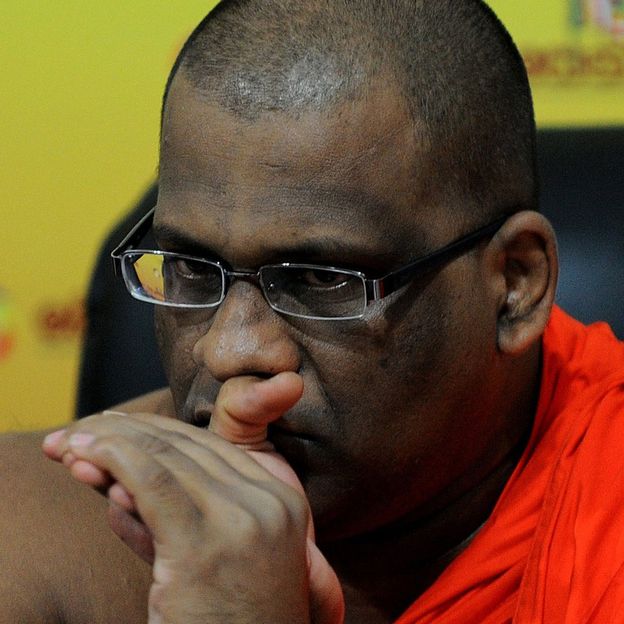
Galagoda Aththe Gnanasara Thero Photo AFP
This firebrand strain of Buddhism is not new to Sri Lanka. A key Buddhist revivalist figure of the early 20th Century, Anagarika Dharmapala, was less than complimentary about non-Sinhalese people. He held that the “Aryan Sinhalese” had made the island into Paradise which was then destroyed by Christianity and polytheism. He targeted Muslims saying they had “by Shylockian methods” thrived at the expense of the “sons of the soil”.
And later, in 1959 Prime Minister SWRD Bandaranaike was assassinated by a Buddhist monk – the circumstances were murky but one contentious issue was the government’s failure to do enough to ensure the rights of the Sinhala people.
The long war against the Tamil Tigers – a violent rebel group purporting to speak for the Tamil minority – brought the hard-line Buddhists into their own once more. Portraying the war as a mission to protect the Sinhalese and Buddhism, in 2004 nine monks were elected to parliament on a nationalist platform. And it was from the monks’ main party that Gnanasara Thero later broke away, in time forming the BBS. It is now the most prominent of several organisations sharing a similar ideology.
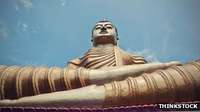 Since 2012, the BBS has embraced direct action, following the example of other like-minded groups. It raided Muslim-owned slaughter-houses claiming, incorrectly, that they were breaking the law. Members demonstrated outside a law college alleging, again incorrectly, that exam results were being distorted in favour of Muslims.
Since 2012, the BBS has embraced direct action, following the example of other like-minded groups. It raided Muslim-owned slaughter-houses claiming, incorrectly, that they were breaking the law. Members demonstrated outside a law college alleging, again incorrectly, that exam results were being distorted in favour of Muslims.
Now that a Tamil adversary has been defeated, Muslims seem to be these nationalists’ main target, along with evangelical Christians whom they accuse of deceitfully and cunningly converting people away from Buddhism.
But can the BBS be called violent? “Whenever there is something wrong done by a Buddhist monk everything [is blamed on] us because of our popularity,” says BBS spokesman Dilantha Withanage.
“BBS is not a terror organisation, BBS is not promoting violence against anyone… but we are against certain things.” He cites threats by Islamic State to declare the whole of Asia a Muslim realm.
Time and again he and his colleague bracket the word “Muslim” together with the word “extremist”.
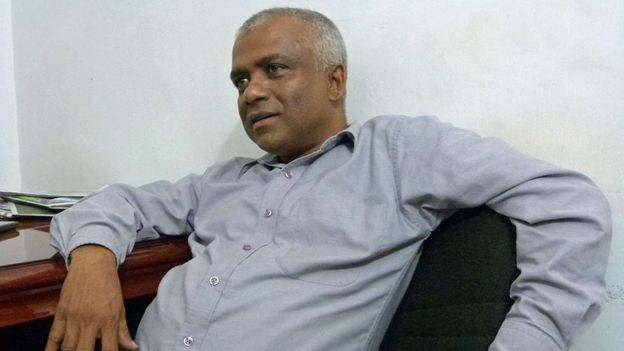
“BBS is not promoting violence against anyone” – Dilantha Withanage
They are not the only Sinhalese who express discomfort at a visible rise in Muslim social conservatism in Sri Lanka. More women are covering up than before and in parts of the country Saudi-influenced Wahabi Muslims are jostling with more liberal ones.
Yet there is no evidence of violent extremism among Sri Lankan Muslims. Rather, they have been at the receiving end of attacks from other parts of society.
In the small town of Aluthgama last June, three people died in clashes that started when the BBS and other Buddhist monks led an anti-Muslim rally in a Muslim area. At the time, I met Muslim families whose homes and shops had been burnt and utterly destroyed, and who were cowering in schools as temporary refugees.
Moderate Buddhists have also been targeted by hard-line ones.
Last year Rev Wathareka Vijitha Thero was abducted, rendered unconscious, tied up and forcibly circumcised – he says this was meant as a gesture of ridicule because he had worked for closer cooperation between Buddhists and Muslims.
He believes Buddhist monks – he doesn’t know who or whether they were aligned with any particular group – were responsible.
In a separate case, a few weeks earlier, Vijitha Thero had held a news conference to highlight the grievances of the Muslim community – the gathering was broken up by the BBS. Gnanasara had hurled insults and threatened him: “If you are involved in this type of stupid treachery again, you will be taken and put in the Mahaweli River,” he said.
The reference to the Mahaweli is significant – there was a left wing insurrection against the Sri Lankan government in 1989 – it’s estimated 60,000 people disappeared and many dead bodies were dumped in the river.
Another country where fierce Buddhism has recently made headlines is Myanmar, formerly known as Burma. A Buddhist faction there, the 969 movement, is known for strident anti-Muslim campaigns that have triggered widespread violence.
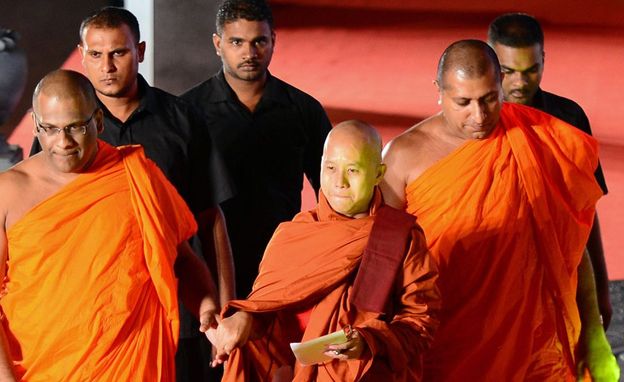
Myanmar monk Shin Wirathu arrives with Gnanasara Thero for the Bodu Bala Sena (BBS) or Buddhist Force convention in Colombo on September 28, 2014
Its leader, Shin Wirathu, was recently invited to Sri Lanka by the BBS. Both organisations say that even if Buddhism predominates in their own countries, overall it is under threat. “We want to protect it, therefore we signed a memorandum of understanding on forming alliances in the Asian region,” says Withanage.
In January, Sri Lanka unexpectedly elected a new president, Maithripala Sirisena. He told me that “everybody knows” who gave rise to the BBS – implying that it was the administration of his predecessor, Mahinda Rajapaksa. The previous government was, at least, strongly supportive of the organisation.
And the group thrived because the rule of law had broken down, according to the new minister for Buddhist affairs, Karu Jayasuriya. He has told me that the BBS will be reined in. On Tuesday, Gnanasara Thero was arrested for taking part in an unauthorised demonstration but later freed on bail. Thus far, the new government – which, like the old one, includes a strongly Buddhist nationalist party – seems timid about taking on the men in orange.
Theravada Buddhist are killing Moslems in Burma. Aung Suu Si remains quiet! Killing of Tamils as traditional enemies in the Buddha-island is an eye-sore. Any religion with the extremist views mixed in hatred politics is a perfect cocktail for annihilation.